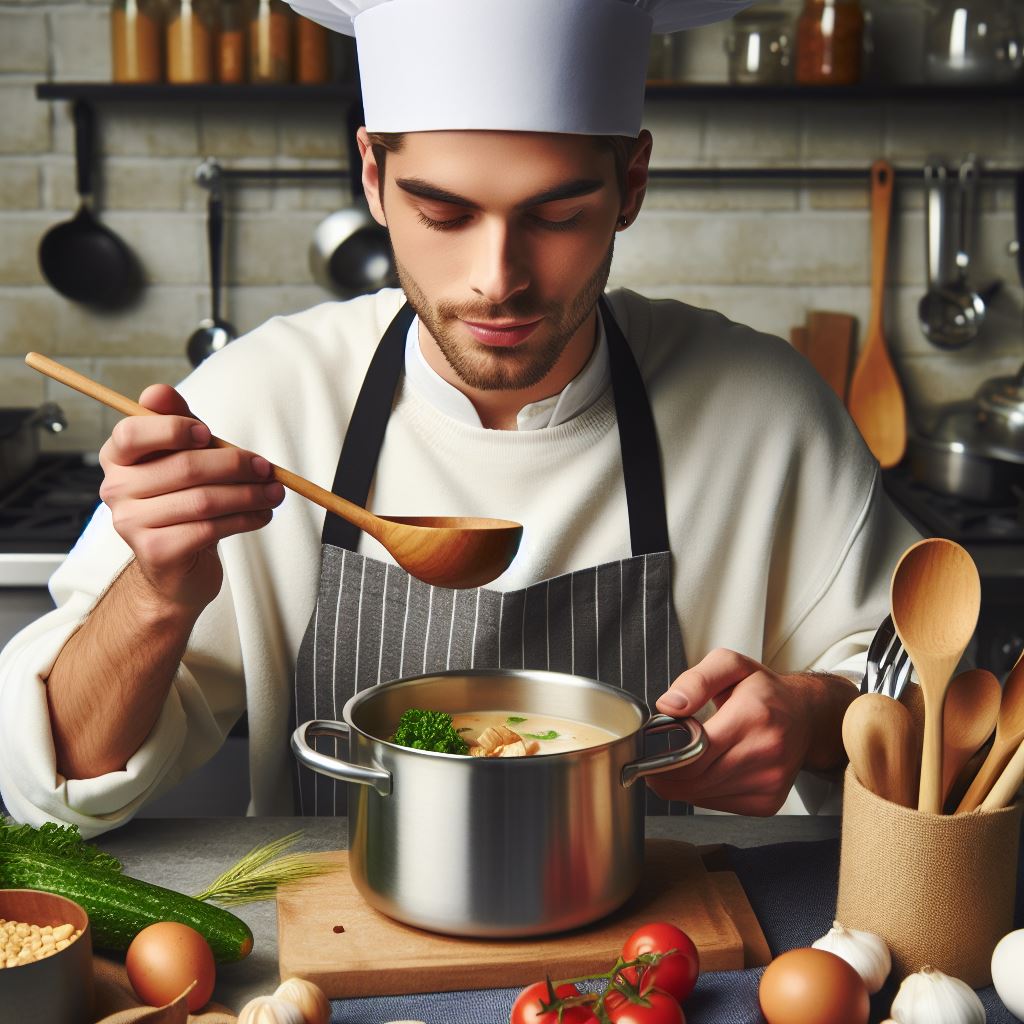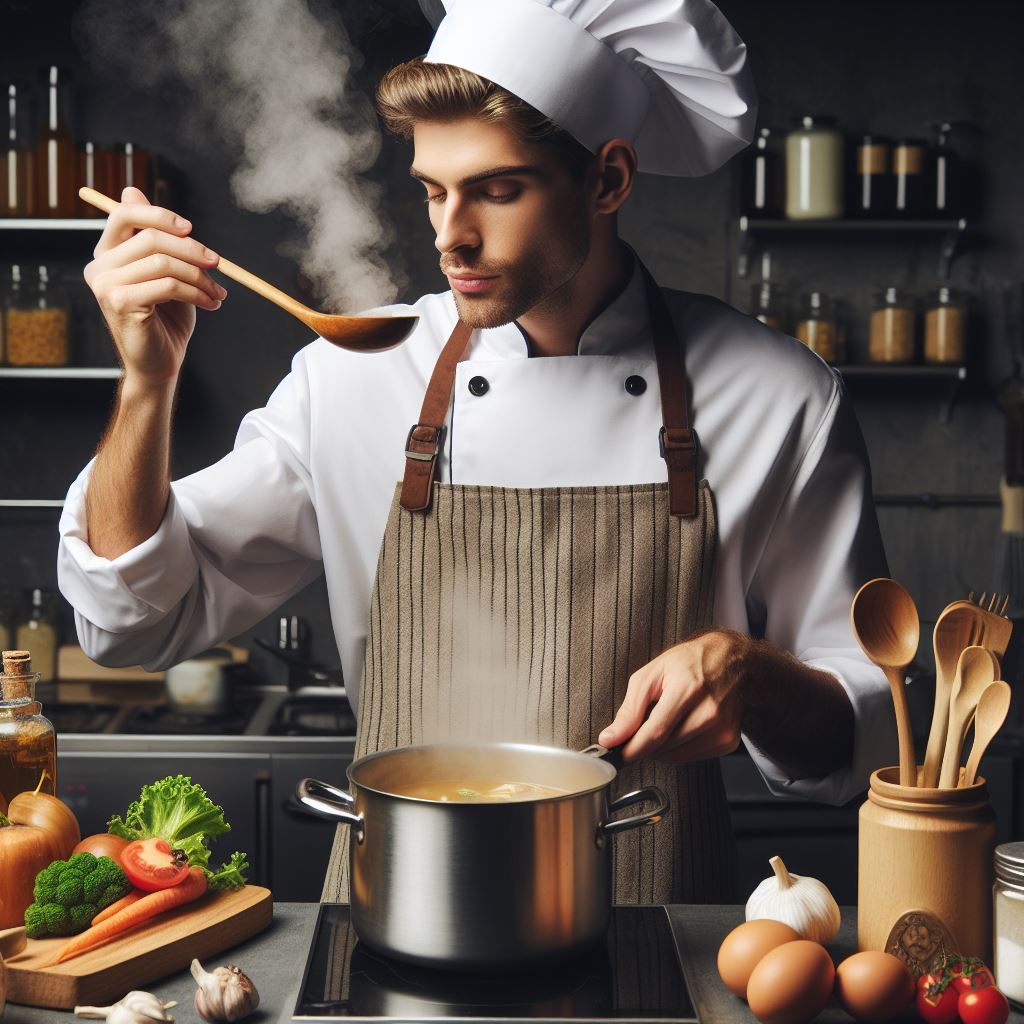Introduction
In recent years, sustainability has become a hot topic across various industries, including the culinary world.
Chefs in the UK are now focusing on sustainability as well, recognizing the importance of using locally sourced, organic ingredients.
This blog post will delve into the impact of sustainability on the UK chef profession.
From reducing food waste to supporting local farmers, UK chefs are taking proactive steps towards a more sustainable approach to cooking.
By creating menus that showcase seasonal produce and promoting ethical farming practices, chefs are not only providing delicious meals but also making a positive difference in the environment.
In addition, the introduction of sustainable seafood options and plant-based dishes are becoming more prevalent in UK restaurants, catering to the growing demand for healthier and eco-friendly dining choices.
Sustainability is not just a passing trend but rather a necessary focus for chefs who seek to provide quality dining experiences while preserving the planet’s resources for future generations.
It is an opportunity for chefs to lead the way and inspire others to adopt sustainable practices in their own professions.
The next sections of this blog will explore practical tips and success stories of UK chefs who are championing sustainable cooking, showcasing their dedication and creativity in promoting a more sustainable future for the culinary industry.
The Role of Chefs in Sustainable Practices
The influential position of chefs in the food industry
- Chefs hold a powerful position within the food industry due to their ability to influence consumers.
- They have the opportunity to shape consumer preferences and behaviors through their menu choices.
- As tastemakers, chefs can set trends and introduce sustainable practices to a wide audience.
- Their role extends beyond culinary expertise to include environmental stewardship and social responsibility.
- Chefs can serve as role models and inspire other industry professionals to adopt sustainable practices.
The impact chefs can have in promoting sustainable practices
- Chefs have direct control over the ingredients they use, giving them the power to source sustainably.
- By choosing local, organic, and ethically produced ingredients, chefs can reduce the environmental impact of their menus.
- They can support local farmers, fishermen, and producers, contributing to the local economy and reducing food miles.
- Chefs can minimize food waste by practicing nose-to-tail cooking and creatively using leftover ingredients.
- They can implement energy-efficient cooking techniques and reduce water consumption in their kitchens.
The potential for chefs to educate and inspire consumers about sustainability
- Chefs can educate consumers about the environmental and social benefits of sustainable food choices.
- Through menu descriptions and storytelling, they can raise awareness and create a connection between food and sustainability.
- By hosting cooking classes, workshops, and farm-to-table events, chefs can engage and inspire consumers to embrace sustainability.
- They can collaborate with local schools, communities, and organizations to advocate for sustainable food practices.
- Through social media and online platforms, chefs can share their knowledge and experiences, reaching a wider audience.
In short, chefs play a crucial role in promoting sustainability in the food industry.
Their influential position allows them to shape consumer preferences, introduce sustainable practices, and educate and inspire consumers about sustainability.
By making conscious choices in sourcing ingredients, minimizing food waste, and adopting energy-efficient techniques, chefs can lead the way towards a more sustainable future for the culinary world.
Read: Famous UK Chefs: Stories of Culinary Success
The Environmental Benefits of Sustainable Cooking
Reduction of Energy Consumption in Sustainable Cooking Methods
- Sustainable cooking methods prioritize energy efficiency, reducing the overall environmental impact.
- Techniques such as steaming, grilling, and using induction cooktops require less energy compared to traditional methods.
- By utilizing energy-efficient appliances, chefs can significantly decrease their carbon footprint.
- Smart kitchen technologies, like energy-saving ovens and refrigeration systems, further contribute to energy conservation.
- Cutting back on energy consumption not only benefits the environment but also lowers operational costs for chefs.
Importance of Sourcing Local and Seasonal Ingredients
- By sourcing local ingredients, chefs support local farmers and minimize the carbon emissions associated with transportation.
- Seasonal ingredients have a lower environmental impact as they require less energy-intensive production methods.
- Choosing local and seasonal ingredients also ensures fresher and more flavorful dishes for customers.
- Engaging in direct partnerships with local producers promotes community resilience and reduces reliance on global food systems.
- Chefs can actively preserve biodiversity by incorporating locally sourced ingredients with unique flavors into their menus.
Significance of Minimizing Food Waste in Sustainability Efforts
- Food waste generates significant greenhouse gas emissions when it decomposes in landfills.
- Sustainable chefs adopt practices such as root-to-stem cooking and nose-to-tail meat consumption to minimize waste.
- Implementing proper portioning and inventory management systems can prevent overproduction and food spoilage.
- Donating excess food to shelters or composting can help divert waste from landfills and contribute to a circular economy.
- By reducing food waste, chefs not only tackle environmental concerns but also improve their bottom line through cost savings.
Considering the environmental benefits of sustainable cooking, it is clear that chefs have a crucial role to play in promoting sustainability.
By adopting energy-efficient cooking methods and utilizing smart kitchen technologies, chefs can significantly reduce their carbon footprint while also saving on operational costs.
Personalized UK Career Consulting
Receive tailored career guidance designed just for you. Get actionable steps and expert support to boost your career in 1-3 days. Take control of your career now.
Get StartedMoreover, the importance of sourcing local and seasonal ingredients cannot be overstated.
This practice supports local farmers, reduces carbon emissions associated with transportation, and ensures fresher and more flavorful dishes.
By endorsing local produce, chefs contribute to community resilience and biodiversity preservation.
In addition to sourcing, minimizing food waste is a fundamental aspect of sustainable cooking.
By implementing practices like root-to-stem cooking and proper portioning, chefs can significantly reduce the amount of food heading to landfills.
Donating excess food or composting further contributes to a circular economy and reduces greenhouse gas emissions.
In fact, sustainable cooking brings numerous environmental benefits.
Chefs have the power to reduce energy consumption, support local communities, and minimize food waste.
By embracing sustainable practices, chefs in the UK can spearhead the movement towards a more sustainable and environmentally conscious food industry.
Read: Navigating the UK Chef Job Market in 2024
Sustainable Sourcing and Food Ethics
The concept of sustainable sourcing in the culinary industry
When it comes to sustainable sourcing, the culinary industry plays a crucial role.
Chefs are increasingly aware of the need to source ingredients from sustainable and environmentally friendly sources.
One aspect of sustainable sourcing is the use of organic and locally grown produce.
Chefs are now prioritizing ingredients that are free from pesticides and chemicals, which not only benefits the environment but also contributes to healthier and more nutritious meals.
Your Dream Job Starts with a Perfect CV
Get a tailored CV and cover letter that captures your unique strengths and stands out in your industry. Let us help you make an unforgettable first impression.
Get StartedThe culinary industry has the power to support local farmers and suppliers, promoting a more sustainable and resilient food system.
By sourcing ingredients locally, chefs can shorten the supply chain and reduce transportation-related emissions.
The positive impacts of supporting local farmers and suppliers
By supporting local farmers and suppliers, chefs can help strengthen the local economy and foster community connections.
This, in turn, will contribute to the overall sustainability of the culinary industry.
Local sourcing also ensures that chefs have access to fresh and seasonal produce, leading to better taste and quality in their dishes.
It allows them to showcase the unique flavors of the region, promoting its cultural heritage.
Furthermore, supporting local farmers and suppliers encourages biodiversity preservation.
By using a variety of locally grown ingredients, chefs contribute to the preservation of traditional crops and animal breeds that may otherwise be lost.
The ethical considerations when sourcing sustainable and ethical ingredients
Sourcing sustainable and ethical ingredients goes beyond environmental considerations.
Ethical considerations involve fair trade practices, animal welfare, and social responsibility.
When sourcing sustainable fish and seafood, for example, chefs must ensure that the species are not overfished and are caught using methods that minimize bycatch and damage to marine ecosystems.
Similarly, when sourcing meat and poultry, chefs should prioritize suppliers that adhere to high animal welfare standards.
This includes providing animals with a natural and humane living environment and avoiding the use of growth hormones or antibiotics.
Furthermore, chefs have the responsibility to support suppliers that follow fair trade practices, ensuring that workers are paid fair wages, have safe working conditions, and are not exploited.
Optimize Your LinkedIn for Success
Boost your LinkedIn profile with a professional bio, keyword-rich headline, and strategic recommendations that attract recruiters. Stand out from the crowd and get noticed.
Optimize NowBy considering these ethical aspects, chefs can support a more sustainable and ethical food system, where each ingredient is sourced with respect for the environment, animals, and people involved in its production.
In essence, sustainable sourcing in the culinary industry is essential for promoting a more sustainable and resilient food system.
By supporting local farmers and suppliers and addressing ethical considerations, chefs can contribute to environmental preservation, community development, and the overall well-being of society.
Read: UK Chef Salaries: From Commis to Head Chef

Innovative Techniques and Adaptations
The creative approaches employed by sustainable chefs
Sustainable chefs have become masters of innovative techniques, finding new and creative ways to reduce waste and promote sustainability in their kitchens.
From utilizing every part of an ingredient to maximizing its flavor and texture, these chefs are constantly pushing the boundaries of culinary creativity.
For example, instead of discarding vegetable peels and trimmings, sustainable chefs have found ways to transform them into flavorful stocks and sauces.
They have also embraced fermentation and preservation methods to extend the lifespan of food, reducing the need for constant replenishment.
The use of alternative ingredients and plant-based cooking.
Sustainable chefs are championing the use of alternative ingredients and plant-based cooking to reduce the environmental impact of the food industry.
By exploring a wide variety of plant-based ingredients, these chefs create delicious and nutritious dishes that satisfy even the most discerning palates.
They have discovered that vegetables, grains, and legumes can be transformed into innovative and satisfying dishes, showcasing the incredible versatility of plant-based ingredients.
Furthermore, sustainable chefs have also found ways to incorporate local and seasonal produce into their menus, supporting local farmers and reducing the carbon footprint associated with transportation.
The utilization of food scraps and sustainable food practices.
Sustainable chefs are leading the charge in reducing food waste by finding creative uses for food scraps and implementing sustainable food practices.
They recognize that almost every part of an ingredient can be utilized in some way, whether it’s turning fruit peels into vibrant, aromatic powders or repurposing leftover bread into decadent desserts.
By embracing the nose-to-tail philosophy, sustainable chefs minimize waste and maximize flavor, proving that sustainability and culinary excellence can go hand in hand.
In addition, these chefs are actively sourcing sustainable ingredients, such as certified organic and ethically raised produce, to support responsible farming practices.
They prioritize working with local suppliers and building relationships with farmers who share their commitment to sustainability.
Overall, sustainable chefs are revolutionizing the culinary industry by employing innovative techniques, utilizing alternative ingredients, and practicing sustainable food practices.
They are pushing the boundaries of creativity, proving that sustainability and culinary excellence can coexist.
By giving attention to their creative approaches, the use of alternative ingredients, and the utilization of food scraps, we can all support and encourage the growth of sustainable practices within the culinary world.
Read: Bartending in London: Glamour, Challenges, and Tips
Collaboration and Partnerships within the Industry
The Importance of Collaboration among Chefs, Suppliers, and Organizations
Collaboration among chefs, suppliers, and organizations is crucial for the success of sustainable cooking initiatives.
It allows for the sharing of knowledge, resources, and best practices, leading to innovative solutions.
By working together, chefs can create demand for sustainable ingredients, while suppliers can ensure their availability.
Organizations can provide guidance and support, fostering a community of like-minded individuals committed to sustainability.
Notable Sustainable Cooking Initiatives and Partnerships in the UK
Several notable sustainable cooking initiatives and partnerships have emerged in the UK, showcasing the power of collaboration.
The Sustainable Restaurant Association (SRA) works with restaurants to implement sustainable practices and reduce their environmental impact.
Through their initiatives, such as Food Made Good and One Planet Plate, they inspire chefs and consumers to make more sustainable food choices.
Chefs Manifesto, an initiative launched by the United Nations, brings together chefs from around the world to promote sustainable food systems.
In the UK, chefs like Jamie Oliver and Hugh Fearnley-Whittingstall have been actively involved in spreading the message of sustainable cooking.
The Impact of Industry Partnerships on Sustainable Practices and Initiatives
Industry partnerships play a significant role in driving sustainable practices and initiatives within the culinary world.
These partnerships create a ripple effect, as they influence both chefs and consumers to adopt sustainable approaches.
By collaborating with suppliers, chefs can source local, seasonal, and organic ingredients, supporting sustainable farming practices.
Partnerships with organizations help chefs implement sustainable policies, such as reducing food waste and carbon emissions.
Furthermore, industry partnerships facilitate knowledge exchange, enabling chefs to learn from each other’s successes and failures.
Collaboration and partnerships within the industry also enable chefs to tackle broader sustainability challenges.
For instance, the Chefs’ Manifesto focuses on achieving the United Nations Sustainable Development Goals (SDGs).
By working together, chefs can address issues such as hunger, malnutrition, and climate change through their cooking practices.
Partnerships with organizations like the SRA allow chefs to access tools, resources, and training to make a significant impact.
In general, collaboration among chefs, suppliers, and organizations is vital for advancing sustainable cooking practices in the UK.
Through partnerships, chefs gain access to resources and support, ultimately driving positive change in the culinary industry.
Notable initiatives and partnerships in the UK have demonstrated the potential of collaborative efforts in achieving sustainability goals.
By working together, chefs can inspire consumers, source sustainable ingredients, and contribute to a more sustainable future.
Challenges and Opportunities for UK Chefs in Sustainability
Potential obstacles faced by chefs in integrating sustainable practices
- Limited Availability: Chefs may find it challenging to source sustainably produced ingredients due to limited availability in certain regions.
- Cost Considerations: Implementing sustainable practices can sometimes result in higher costs, especially when sourcing organic or local ingredients.
- Consumer Demand: Some chefs may face resistance from diners who are not yet fully educated or receptive to sustainable dining concepts.
- Lack of Awareness: Chefs may struggle to stay updated on the latest sustainable practices and technologies available in the industry.
The opportunities for UK chefs in promoting sustainable dining experiences
- Differentiation: Chefs who prioritize sustainability can set themselves apart from competitors, attracting environmentally-conscious customers.
- Enhanced Reputation: Promoting sustainable dining helps build a positive brand image, leading to increased credibility and customer loyalty.
- Innovation and Creativity: Embracing sustainable practices encourages chefs to think outside the box, resulting in unique and innovative culinary experiences.
- Collaboration and Networking: Chefs can collaborate with local farmers, suppliers, and communities to create a cohesive sustainable food system.
Ways in which aspiring chefs can contribute to the sustainability movement
- Education and Training: Aspiring chefs should seek out educational programs that focus on sustainable cooking practices and techniques.
- Supporting Local Suppliers: By prioritizing local ingredients, chefs can reduce carbon footprint and support local farmers and producers.
- Minimizing Food Waste: Aspiring chefs should learn to minimize food waste through proper portioning, creative recipes, and composting.
- Community Engagement: Getting involved in local sustainability initiatives and sharing knowledge can inspire others to adopt sustainable practices.
In a nutshell, while integrating sustainable practices may present challenges for UK chefs, it also presents valuable opportunities.
Addressing potential obstacles through increased awareness and availability of sustainable ingredients can pave the way for a more sustainable culinary industry.
UK chefs who embrace sustainability can gain a competitive edge, enhance their reputation, and contribute to the larger sustainability movement.
Aspiring chefs, on the other hand, can actively participate by seeking education, supporting local suppliers, minimizing food waste, and engaging with their communities.
Together, chefs have the power to transform the way we dine, making sustainability a focal point in the UK’s culinary landscape.
Conclusion
Sustainability, paramount for UK chefs, preserves ecosystems, reduces waste, and fosters responsible food practices.
Sustainability plays a crucial role in the UK chef profession, as it ensures the longevity and health of our environment and communities.
Support sustainable restaurants; opt for ethically-sourced ingredients—your choices shape a greener future.
We can support sustainable restaurants and make a difference by choosing sustainably-sourced ingredients in our own cooking.
Chefs have a powerful influence in shaping consumer choices and can drive positive change towards a more sustainable future.
Embrace sustainability, guide patrons towards eco-conscious dining.
Together, a sustainable culinary revolution awaits.
[E-Book for Sale]
500 Cutting-Edge Tech Startup Ideas for 2024 & 2025: Innovate, Create, Dominate
$19.99 • 500 Tech Startup Ideas • 62 pages
You will get inspired with 500 innovative tech startup ideas for 2024 and 2025, complete with concise descriptions to help you kickstart your entrepreneurial journey in AI, Blockchain, IoT, Fintech, and AR/VR.




